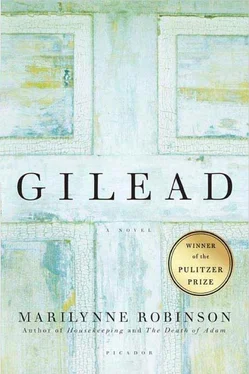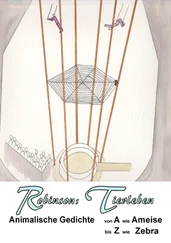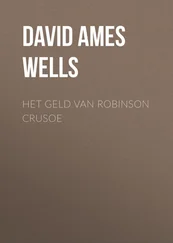“Understanding” might be the wrong word, since I have never spoken to her about him, and it is precisely the fact of her knowing so little about him that worries me. Or “understanding” might be exactly the right word, no matter what she knows or does not know. I can’t decide which thought worries me more. Maybe neither one could worry me more.
I sent him a note. It said I was the one who should apologize, that my health has not been perfect lately, and so on, that I hoped we might have a chance to speak again soon. And your mother carried the note back to him.
I was thinking about the time when he was just ten or twelve and he filled my mailbox with wood shavings and set them on fire. He rigged up a sort of fuse of twine dipped in paraffin. At that time the mailbox was on a post by the gate. It was that loaf-shaped kind people use in the country. I was walking home from a meeting at the church in the dark of a winter evening. I heard a poof and looked up, and just then flames came pouring out of the mouth of that box. It gave me quite a turn. But I didn’t doubt for a minute whose prank it was.
That boy was always alone, always grinning, always intent on some piece of devilment. He wasn’t more than ten when he took off in a Model T he saw idling in the street downtown.
Cars were still pretty rare around here in those days, so his interest was understandable. He drove it straight west for a number of miles, until it ran out of gas, and then he just walked home. A couple of young fellows with a team of horses happened upon the car and towed it off to Wilkinsburg and traded it for a hunting rifle. I think half the people in the county owned the thing for a day or so over the couple of months it stayed missing. Then a good-sized family who had traded a heifer for it came sailing into Gilead to enjoy the Fourth of July and got themselves arrested. The authorities traced it back through any number of swaps and IOUs and poker games, but never found the original thief. As it turned out, there were so many people involved in minor criminality having to do with buying that car and selling it that the resources of the law were in no way sufficient, so the whole thing was forgotten officially and remembered for a long time afterward because it made such a good story. People clearly knew the car was stolen, but they couldn’t resist owning it for a little while, even though they didn’t have the nerve to keep it — which kept the price very reasonable and the temptation that much greater.
It was Jack himself who told me what he had done. He’d kept the handle from the glove box as a souvenir and he showed it to me, but I would have believed him anyway. Shrewd as he was even as a youngster, he knew I would never speak to anyone about it, and I never did. Of course, I thought his parents should know, and still, I never had the heart to say a word. I was always a little in awe of a child who could keep a secret like that, when it would have been the perfection of the tale to know that a ten-year-old boy had incriminated half a county.
There is a sadness in all this I do not wish to obscure. I mean a sadness in the child. I remember coming out of the house one morning and finding my front steps painted with molasses. The ants were so thick they were piling over each other. They were just absolutely solid. Now, you have to ask yourself, How lonely would a child have to be to have time to make such a nuisance of himself? He developed some method for breaking my study windows so that the whole pane would shatter altogether. It was remarkable. I will ask him how he did that, someday when our souls are at peace and we can laugh about it.
That is the sort of thing he did as a young boy, mischief only bordering on harm, generally speaking. That is my belief, though certain harmful things were done which I have never wished to ascribe to him but which, in the privacy of my thoughts, I always did. For example, there was a barn fire, and some animals were lost in it. I may be wrong in blaming him for that.
His transgressions were sly and lonely, and this became truer as he grew up. I believe I said earlier that he did not steal in any conventional sense, but by that I meant he stole things of no value except to the people he stole them from. There was no sense in what he did, unless his purpose was to cause a maximum of embarrassment and risk a minimum of retribution.
When he was fifteen or sixteen, he’d come into the house while I was at the church and pocket one thing or another. It was the most irritating trick you could imagine. Once, he took that old Greek Testament right off my desk. If ever there was a thing on earth so little worth the trouble of stealing I don’t know what it would be. Once, he stole my reading glasses. Once, I came in when he was standing right there in the parlor. He just laughed and said, “Hello, Papa,” cool and charming as you please. He made some small talk, in that precocious way he had, smiling as if there were a joke between us. It took me a while to figure out what was missing that time. Then I realized it was a little photograph in a velvet case of Louisa, taken when she was a child. I was as angry about that as I have ever been in my life just the sheer meanness of it. And how could I tell Boughton that he had done such a thing? How could I say the words?
Things would drift back sooner or later. The Greek Testament was left on the doormat. The photograph appeared on Boughton’s hall table, mysteriously, and was brought back to me. That penknife with the word “Chartres” pressed into the handle, which was made from a shell casing, was left on the kitchen table, plunged through an apple. I found that disconcerting at the time.
Then he started doing the things that got his name in the newspaper, stealing liquor and joyriding, and so on. I’ve known young fellows who spent time in jail or got themselves sent off to the navy for behavior that wasn’t any worse. But his family was so well respected that he got away with it all. That is to say, he was allowed to go right on disgracing his family.
I notice I have said he seemed lonely. That was one very strange thing about him, because, as I have said also, the Boughtons really loved him. All of them did. His brothers and sisters would stand up for him no matter what. When he was little, he’d slip out, run off, and they’d come by looking for him, anxious beyond their years, all business, hoping to find him and exert their respectable influence on him before he could get into too much trouble. I remember one summer I had planted a row of sunflowers along the back fence. There must have been twenty of them: One afternoon the other little Boughtons came to the door asking for Johnny, as they called him in those days. I went out to help them look around a little, and darned if those sunflowers hadn’t been pulled back, bent over the fence so their heads were hanging down on the other side of it. Glory said, “It could have been the wind that did that.” I said, Yes, maybe it was the wind.
If I had to choose one word to describe him as he is now, it might be “lonely,” though “weary” and “angry” certainly come to mind also. Once during the time I was missing Louisa’s picture I went over to Boughton’s to borrow a book, and we sat on the porch and talked awhile, and that boy sat on the steps, fiddling with a slingshot, I remember, and listening to every word, and from time to time he would look up at me and smile, as if we were in on a joke together, some interesting conspiracy. I found that extremely irritating. He almost provoked me into mentioning the photograph then and there. I had to leave to stop myself. He said, “Goodbye, Papa!” I went home just trembling. Maybe you can see why, when the business with the young girl came up, I was chiefly struck by the meanness of it.
Читать дальше












